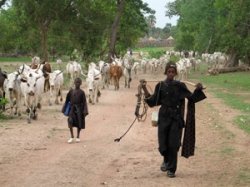
Fulani herdsmen have cleared portions of the Pikaro Forest Reserve, a government gazetted forest, and have put up camps for themselves and their cattle.
The Reserve, which has a total land area of 3,014 square metres, covers Pindaa in the Kassena-Nankana Municipality, Kayoro and Nyangnia in the Kassena-Nankana East District and Chuchuliga in the Builsa South District.
The Germans developed the Forest Reserve after the construction of the Tono Irrigation Dam in 1974 to serve as watershed for the dam to empower more farmers to cultivate the 1015 hectares of irrigated area.
The Reserve, presently turned into a cattle ranch and home to many Fulanis, had served as habitat for endangered species and transition points for wild life such as elephants that move to and from the Mole National Park to the Nazinga Reserves in Burkina Faso
These came to light following a tip off from the Organization for Indigenous Initiatives and Sustainability (ORGIIS), a non-governmental organization that advocates against environmental mismanagement.
When the GNA visited Pindaa, it noticed that the Fulani herdsmen had entered the interior parts of the Forest Reserve and made the place their home together with their cattle, wives and children.
Most of the trees were destroyed as a result of the intensive grazing by hundreds of cattle. It was apparent that they shifted from one place to the other as the cattle fed and destroyed the vegetative cover.
Apart from that it was noticed that they had cut down the trees in the reserve to feed their animals, for erecting tents and also for cocking.
When contacted the Regional Directorate of the Forestry Commission which is mandated to protect the reserve said the Fulani illegality had not yet been brought to their notice.
The Deputy Regional Director, Mr Samuel Akortiah, said they would initiate plans to flush them out with the help of the security agencies.
The Assemblyman for Pindaa electoral area, Mr Ayibu Abalade, blamed the Forestry Commission for being irresponsible and said the Fulani herdsmen were from Burkina Faso, Mali and Niger and had been in the Reserve for three years now.
He said government took the land from the communities without compensating them and if government was no longer interested in the area it should hand it back to the communities to use instead of allowing foreigners to destroy the area.
The Coordinator of ORGIIS, Mr Julius Awaregya, said it was only in Ghana that such things would be tolerated and added that in the countries where the Fulani herdsmen were coming from it was prohibited for animals to graze in forests.
He called on the Forestry Commission, the District Assemblies and the traditional authorities to live up to their responsibilities by getting rid of the headsmen from the area.
He said as a result of the activities of the herdsmen, the quantum of water that used to flow into the Tono Irrigation Dam for farming activities had reduced and that would definitely affect farming including the endangered animal and bird species which used to be in the area.
“At this critical period of climate change we sit down as leaders who have been entrusted with the responsibility to protect the natural resources of our country and allow them to be destroyed. Posterity will judge us if we don’t change,” Mr Awaregya said.
A retired public servant who wants to remain anonymous said “we have become spineless amorphous carbons by allowing Fulani herdsmen to humiliate us. We have become a laughing stock in West Africa. How can we allow Fulani herdsmen to settle in our forest reserve? Can this be done in Burkina Faso? Never. Where is the leadership? Where is our national security”